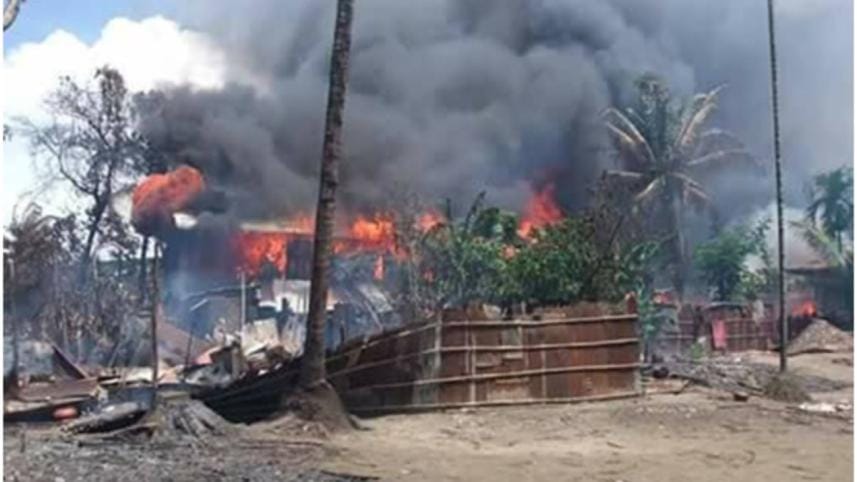The saga of on-going Muslim persecution in Myanmar

In its November 14, 2016 issue the Bangkok Post reports, "Myanmar's Rakhine state was hit by fresh waves of violence over the weekend with more than 30 'insurgents' killed during two days of fighting, the military said, as proof emerged of atrocities against villagers." Another news outlet, Myanmar Observer has reported that Myanmar Army has rained rockets on Rohingya houses in Rakhine state killing scores, burning houses to ashes. When people started flee from their burning houses they were shot at, killing men, women and children.
Recently, London-based The Guardian reported that at the entrance to Thaungtan village in Myanmar's Irrawaddy Delta a brand-new sign asserts, "No Muslims allowed to stay overnight. No Muslims allowed rent houses. No marriage with Muslims". Al-Jajeera also reported cases similar rise in systematic eviction, rape, loot and arson of Rohingyas (the Muslims of Myanmar's Rakhine State) by the military. Bangkok Post in another report highlights that soldiers in Shey Kya village in Rakhine State "raided their (Rohingya) homes, looted property and raped them at gun point." The UN envoy on human rights in Myanmar, confirmed "repeated allegations of arbitrary arrests as well as extrajudicial killings occurring within the context of the security operations conducted by the authorities in search of the alleged attackers".
These incidences indicate a clear pattern of ethnic cleansing. But the Myanmar Government neither denies nor confirms these acts of violence against Muslims in Myanmar. Instead it claims that some of the army actions are responses to '400 strong rebel actions' of Rohingyas. But this claim of 'armed resistance with foreign support' is yet to be verified by any credible source, nor has the Myanmar government named the "foreign" sponsor of Rogingya "insurgency."
Saddest part is this that while this is going on, the Nobel Laureate Ms. Aung San Suu Kyi, once the West's poster-picture of freedom and democracy and once herself a victim of state persecution, and who now heads the Myanmar government has stayed away from saying or doing much. This is baffling especially not just because that as a Peace Nobel Laureate she ought to have stood for human rights but that as the head the current Myanmar government she is morally bound and administratively enabled to do something about it. Instead, she has chosen to remain deafeningly silent or worse, appallingly, evasive of the Muslim plight in her country. What is also quite tragic is that in recent times when a handful of conscientious Myanmar citizens condemned and protested in Yangon against these well-organised acts of persecution of Muslims, Aung San Suu Kyi's police baton-charged the protesters for 'disturbing public order' – a cliché often used to mask institutional suppression of freedom of people.
Aung San Suu Kyi is indifferent to this protracted tragedy in Myanmar mainly because she is but a captive of both dead conscious and naked opportunism for she fears that any show of favour to Myanmar Muslims could easily risk her own position of comfort and glory that she currently enjoys and at the same time, many also argue that she also supports Military's policy of disenfranchisement of Muslims in general and Rohingyas in particular.
The World in general and West in particular are also not doing anything differently, for they are shackled by naked opportunism. In the emerging scenario of imperialist geopolitics the West has cosied up to the Myanmar government in their China containment strategy and therefore, the last thing they would do is condemn the Myanmar government (more precisely, its army) and put in jeopardy its anti-China containment chain that it believes it has laid by befriending an army that is known for its shrewdness and also its blatant human rights abuses. Principles are the first casualty of opportunism.
Closer to the theatre of tragedy, Bangladesh, Myanmar's oppressed Muslims' closest Muslim neighbour is also noticeably depressingly mute to the plights of its compatriots across the border and this may be due to its government's policy framework that is utterly self-seeking and thus ethically incongruous and this is sad.
At an individual level and from his haloed position Bangladesh's Nobel Peace Laureate, Professor Muhammad Yunus, who happens also to be ethnically, religiously and even spoken dialect-wise closest to the Rohingyas could easily bring the issue to the attention of the international community or at least to his Nobel Peace colleague, Aung San Suu Kyi to address, but has also chosen to look the other way for he is but a prisoner of fear.
The world body of Muslims, the Organisation of Islamic Countries (OIC) simply has neither the gall nor the moral standing to do much about the issue either for its members are too busy killing and demonising each other – their own Muslims.
UN, the only body that can and has been raising its concerns from time to time is but a prisoner of its structural limitations that enables it to report but not regulate.
In a situation where institutions and individuals that matter have failed the Myanmar's Muslims, the only hope is conscientious people of the world who are not in millions but in billions that have the power to give voice to the oppressed. They, therefore, must unite and protest in the strongest of terms, internationally and within their own countries through their senators, congressmen, parliamentarians whoever and get their governments to raise the issue of Myanmar's Muslim persecution with Myanmar government loudly for if they don't and choose to remain either silent or "neutral" they, by the words of Desmond Tutu, "have chosen the side of the oppressor!"
The writer is a former senior policy manager of the UN.




 For all latest news, follow The Daily Star's Google News channel.
For all latest news, follow The Daily Star's Google News channel.
Comments